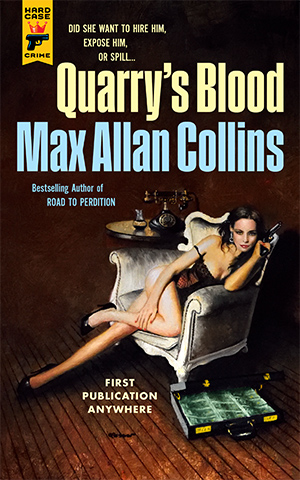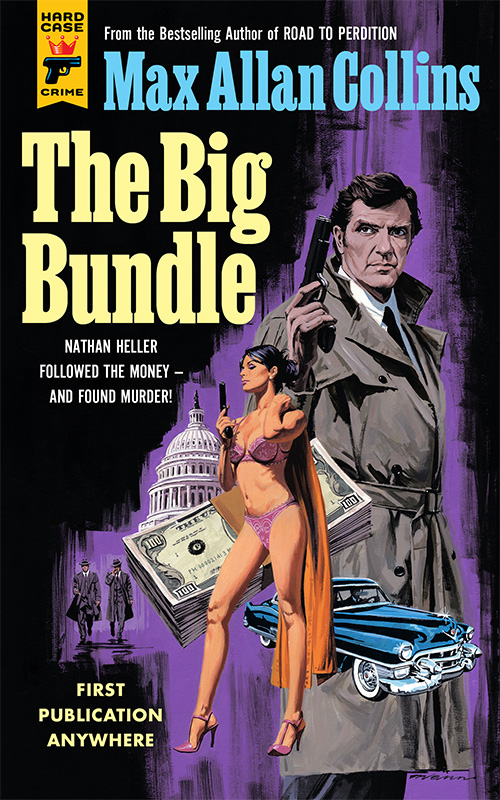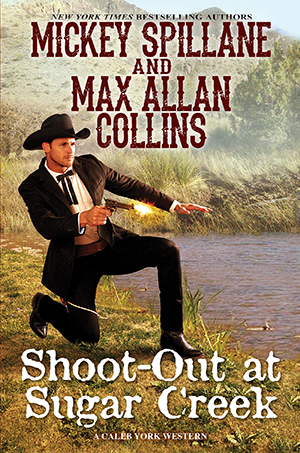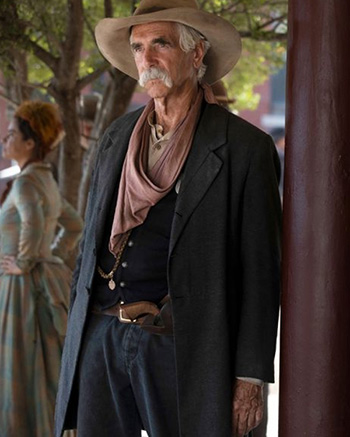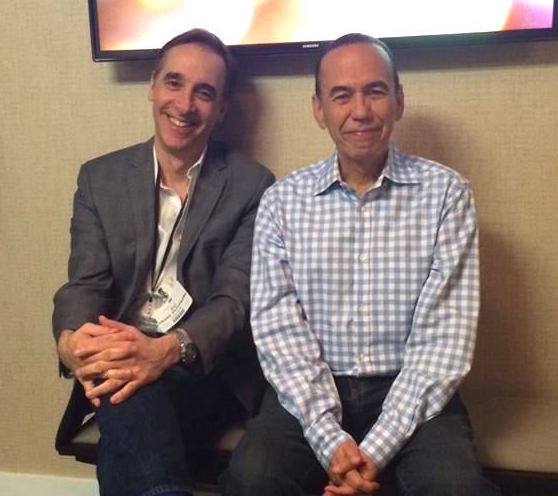Before I discuss losing the Edgar, I want to mention a winning promotion from Thomas and Mercer on certain of my titles on e-book.
True Detective ( ) and True Crime (
) and True Crime ( ) (the first two Nathan Heller novels) will be offered at $1.99 via Mystery, Thriller & Suspense Kindle book deals in the US marketplace, starting 5/1/2023 and running through 5/31/2023. Also on sale at Amazon during that period are three titles by me and my buddy Matt Clemens – What Doesn’t Kill Her (
) (the first two Nathan Heller novels) will be offered at $1.99 via Mystery, Thriller & Suspense Kindle book deals in the US marketplace, starting 5/1/2023 and running through 5/31/2023. Also on sale at Amazon during that period are three titles by me and my buddy Matt Clemens – What Doesn’t Kill Her ( ) ($1.99), Fate of the Union (
) ($1.99), Fate of the Union ( ) ($.99) and Executive Order (
) ($.99) and Executive Order ( ) ($3).
) ($3).
I, of course, did not win the Edgar for Best Paperback, but I assure you I was convinced I wouldn’t. I didn’t go to New York for the ceremony, which – if I thought I had a hootin’ chance in hell – I would have.
Quarry’s Blood is the 16th entry in a series that began in 1976 (actually 1971), and novels in long-running series almost never get nominated by the Edgars. Furthermore, the Quarry novels are perceived by more delicate readers as nasty, and they aren’t necessarily wrong. In any event, I am grateful to those of you who have made Quarry and me a cult success.
This experience – sitting at home, not even remembering that the Edgars were going on in New York while Barb and I watched a Star Trek: The Next Generation episode – was a very good one. Why? Because I have always taken awards too seriously. I have always wanted to win them, being naturally competitive, which has largely been a positive thing in my career, a driving force if you will.
But at this ripe old age I now realize how meaningless awards are. Well, relatively meaningless. If Jim Traylor and I do not get an Edgar nomination for Spillane – King of Pulp Fiction, I guarantee you it will disappoint me. But if we don’t get an Edgar nomination, what is the difference, ultimately? Our Spillane bio is no less definitive and ground-breaking if it does not receive a nomination.
On the most basic level, I have looked at awards as the kind of validation that can keep me in business – much the same way good reviews can benefit a writer’s reputation. A wise soul once said, “If you believe the good reviews, you have to believe the bad reviews, too.” So I have never allowed myself to believe that an award, or a good review, is anything but an opinion, and a potentially useful sales tool. Awards don’t make me a good writer, nor do good reviews. Readers liking my work make me a good writer; editors liking my work make me a good writer; sufficient sales make me a good writer. Or anyway keep me in business.
My father was a respected, even beloved member of our small community (Muscatine, Iowa, has a population of around 25,000 residents). In the early ‘50s, he was the first high school music teacher to mount productions of Oklahoma and Carousel, attracting national attention (they were excellent productions, too). When he left teaching to go into industry as a personnel man, he hired hundreds of people in this community who loved him for it. At the same time he directed a male chorus (the Muscatine Elks Chanters) – for fifty years! – that won so many national championships that the competition was shut down and the Chanters were made the permanent champs. That chorus is gone now because my father is gone – he was their engine and a genius who could make any group of random men sound like a professional chorus.
When he passed, Barb and I stood looking at a wall of award plaques and a tabletop of awards representing all his triumphs and achievements. All but a handful went into the trash. We did not do this cavalierly, but realistically – where would we display them? Where would we store them? We selected the most important ones and the rest of these once precious items, we tossed.
I have – what is the polite term? – a shitload of awards on display in my office and the really important ones are in the living room. Of these, I think my family is likely to hold onto the ones I prize most highly – my Grand Master Edgar from the Mystery Writers of American and my three Shamus awards. Maybe my lifetime achievement from the PWA. Otherwise, it’s probably into the landfill with awards that at the time (and for some time thereafter) meant a lot to me.
Artists – and I am one – are always looking for validation, because the two inescapable facts about all artists (every damn one of them) is their insane confidence in the value of their work and their inner fear that they are frauds. Too much confidence, and no confidence at all. That is the cocktail from which every artist drinks.
If they say otherwise, they are lying, or about as reflective as a broken mirror.
You bet I would like to have won an Edgar for Quarry’s Blood. But I was lucky, incredibly lucky, for that kind of recognition for my fifty year-old series, which happens to be littered with sex scenes and carnage and sometimes black humor (in questionable taste). There were over 250 submissions for Best Paperback, and I made the cut.
Charles Ardai, my great editor at the great Hard Case Crime, insisted I write an acceptance speech, “just in case” (he, too, accurately felt the odds were very much against me).
Anyway, this would have been my acceptance speech (delivered by Charles):
“Quarry was created at the University of Iowa’s Writers Workshop in 1971. Looks like we both have finally graduated. My thanks to editor Charles Ardai (who did not insist I say this) for giving me the opportunity to revive this cult character. And also, for inspiration, to my late mentor Donald E. Westlake, who reminded me that a cult author is seven readers short of making a living.”
Paul Davis, who writes about crime fiction at the Washington Times, wrote an astonishing three pieces about Spillane – King of Pulp Fiction. This incredible attention was followed by a favorable reaction to the new Nate Heller novel (from Hard Case Crime), The Big Bundle. He interviewed me about it, and here it is:
This interesting and insightful crime novel is about a fictional private eye traversing through a begone era and a true and once famous child kidnapping.
In “The Big Bundle,” Max Allan Collins’ 18th novel featuring Nathan Heller, the private detective appears alongside Robert F. Kennedy and Jimmy Hoffa, as well as historical crime and law enforcement figures involved in the real-life kidnapping of a millionaire’s son in 1953.
I contacted Mr. Collins and asked him to describe “The Big Bundle.”
“In many respects, it’s a private eye thriller in the tradition of Dashiell Hammett, Raymond Chandler and Mickey Spillane,” Mr. Collins replied. “I was moving to a new publisher, Hard Case Crime, and knew their audience was steeped in hardboiled fiction and might be put off by the famous crimes I usually look at in a Nathan Heller novel. The real-life case in ‘The Big Bundle,’ quite well known in the 1950s but forgotten now, allowed me to put the emphasis on the noir aspect of the Heller novels and not be accused of teaching a “history lesson.”
How would you describe Nathan Heller?
“Heller is a businessman who starts out in a small office where he sleeps on a Murphy bed and winds up with a coast-to-coast detective agency. He is not the typical Phillip Marlowe-style modern-day knight who would never take a bribe or seduce a virgin — Heller has done both and often indulges in situational ethics. Unlike most fictional private eyes, he marries (more than once) and is a father and had a father and mother and even grandparents. He ages with the years. At any age, Heller recoils at injustice in society and serves up rough justice when he feels it necessary. He not only knows where the bodies are buried, he has buried more than his share.”
Why have you written a series of crime novels based on historical events with a fictional character interacting with historical figures?
“Rereading ‘The Maltese Falcon’ for a college class I was teaching in the early 1970s, I noticed the 1929 copyright. I had a light-bulb moment: The St. Valentine’s Day Massacre was 1929 — Sam Spade and Al Capone were contemporaries! Instead of Mike Hammer meeting a Capone type, I could have Capone meeting a Mike Hammer type. It was a fresh way into a form that had gone stale,” Mr. Collins (seen in the bottom photo) explained. “What evolved, from the initial novel about Frank Nitti’s Chicago (“True Detective,” 1983), was Heller solving famous unsolved or controversially solved crimes, like the Lindbergh kidnapping, the Black Dahila murder, the assassinations of Huey Long and JFK. Often, I substitute him for a real detective involved in a case. Heller becomes a sort of ‘private eye witness’ to history.”
How did you research the history that you use in “The Big Bundle”?
“Less was available about the Greenlease case than with most mysteries Heller has tackled — both Amelia Earhart’s disappearance, the Roswell incident, required dealing with a staggering number of books and voluminous newspaper and magazine material. Only a handful of books about the Greenlease kidnapping existed to draw upon in “The Big Bundle.” But the political aspect — Bobby Kennedy and Jimmy Hoffa’s involvement in the aftermath of the ransom’s disappearance — meant referring to several dozen nonfiction works, as well as the usual newspaper and magazine articles, which the kidnapping itself also generated. The idea is that I prepare to write the definitive nonfiction book on a real crime or mystery. Then I write a private eye novel instead.”
Did you discover anything in your research that surprised you about the kidnapping and other elements you use in your novel?
“Automobiles were everywhere in the narrative, befitting the postwar boom in car buying and interstate travel. Key events took place at a famous no-tell motel, the Coral Court, outside St. Louis. A crooked taxicab company was caught up in the probable theft of half the ransom, and every criminal in the case seemed either to drive a Caddy or want to — purchased inevitably at one of the many Midwestern Cadillac dealerships owned by the kidnap victim’s father.”
Do you plan to continue the Nathan Heller series?
“Too Many Bullets” has been completed, with Heller present in the pantry at the Ambassador Hotel when Robert Kennedy was shot. It’s an open-and-shut case, supposedly, yet the research indicates otherwise. In many respects, the real story is like something out of Raymond Chandler: hit men, crooked cops, a crazy hypnotist, a duplicitous showgirl. That comes out in October, again from Hard Case Crime. There may be one more after that. The degree of difficulty here is high, however, and I just turned 75, so it depends on how well Heller and I hold up.”
CBR.com has this good article about the comic book roots of Mike Hammer.
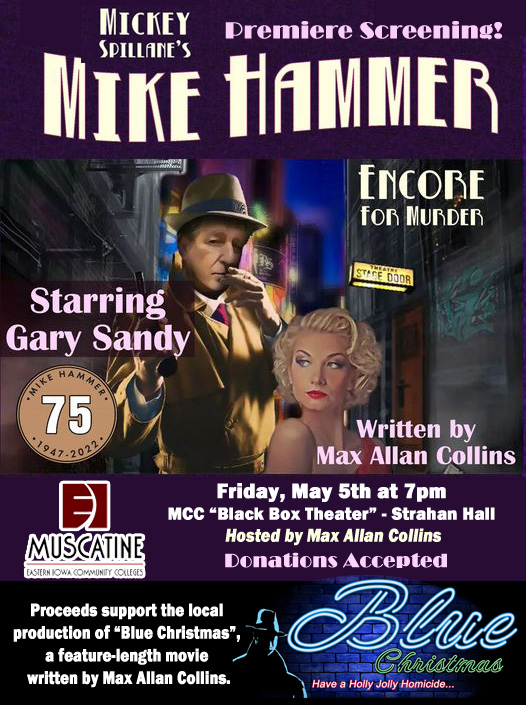
For those of you close enough to Muscatine, Iowa, to consider attending, here’s the info about the screening of Mickey Spillane’s Encore for Murder starring Gary Sandy this coming Friday, May 5.
And finally thanks to those of you who have contributed to the Indiegogo campaign for Blue Christmas, and I hope more of you will consider pitching. We’re just under $1700 (of the $5000 goal) with about a month left to go.
M.A.C.
